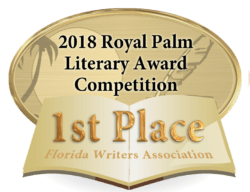
Bill Dougherty isn’t afraid to roll up his sleeves and do whatever it takes to create a successful screenplay. Years of learning craft? Check. Intense study of industry standards? You bet. Dive deep into research to get every detail right? Done. He’s written fourteen novels and eleven screenplays and continues to hone his craft with each one. In this week’s RPLA Showcase, Bill Dougherty, First Place winner for Unpublished Screenplay, shares the importance of themes in screenplays and how he integrates deep research into his work.
First Attempts at Writing
I’ve been writing all my life. My mother told me I wrote stories as soon as I learned to put words together. I attempted my first novel in 1984. I wrote it while deployed aboard the USS Saratoga to the Mediterranean. The novel was called Dream Killers. Twelve dozen native American Indians—men, women, and children—were massacred by the Army in 1874 about 90 miles south of Las Vegas (and the scary part is that after I imagined this, I found out later in research that it really happened). In the site where the massacre occurred, a town called Dreamtown had been built. Two hundred years later, the spirits of those murdered return to exact their revenge. They do it by creating nightmares. At the height of the nightmare when the person lurches forward screaming, the spirits stab the victim’s neck with an alternating (positive/negative) charge and suck the electricity out of their body. Everything in the body stops at once. A great premise, but my writing was so poor because I knew nothing about the craft of fiction. It has taken me years to learn. Unfortunately, I no longer have this first manuscript. It exists only in my memory.
Bill’s Favorite Novel and the Need for Research
Your favorite novel should always be the last novel you’ve written. The goal is to get better with each story. The last novel I finished was Angel’s Wings. The idea was formulated more than 20 years ago. I wrote and edited the story this year. It’s about a pregnant Filipino-French-Vietnamese bar girl who rescues a Navy combat helicopter pilot and father of her child from the Hanoi Hilton. The story tested me because I’m not a helicopter pilot. I had to do significant research to make the flight and combat scenes believable.
The Winning Entry, The Onlys
Logline: In 1937 Boston, ten street kids rescue an out-of-work school teacher to protect them from a corrupt Irish cop who wants to nab them and sell them to the Scotsman in Juvenile Hall.
The Onlys began with an idea of ten street children living in the belfry of a Boston Baptist Church. Three works inspired me and made up the pitch for this screenplay: The Lost Boys of “Hook” meet Hans Christian Andersen in the atmosphere of Dennis Lehane’s, The Given Day.
I made an extra effort in this screenplay to incorporate themes. Also, as I worked with screenplay readers, I learned what the industry was looking for in a story. The Onlys included themes like “a desire for family,” “understanding love,” or learning to “trust others.” They were key in the telling the story. Themes added layers and texture and brought characters to life. What I did new in this screenplay is take some Hans Christian Andersen (think Danny Kaye) and try to tell fairy tales to help The Onlys through challenges they were facing, like when Bumper was beat up because he was black, and James Ander Monroe told him a story about Bumper fish. It’s also a challenge to take a story from an unpublished novel and write a screenplay. It’s important to be careful to avoid writing a screenplay in novel form. It doesn’t work. You need to imagine the story as a movie. That’s why many movies are so different from books people read.
The Most Challenging Screenplay He’s Written and Attracting Hollywood
In 2016, my screenplay, Shinyo Maru, also won in the RPLA for Unproduced Play, as well as the Dahris Clair Memorial Award. Shinyo Maru is the true story of the 82 POWs who survived the Battle of Bataan, the Bataan Death March, four Japanese prison camps in 2.5 years, and the sinking of the Japanese Hell Ship Shinyo Maru. It’s harder to write a true story because it’s based on the stories of real people. I met 22 of the remaining survivors at a reunion in 2000 in Jacksonville, Florida. Then I read their stories, asked them questions, and read other books about POWs and Philippine guerillas. I even read a doctoral dissertation on the Battle of the Philippines. I could teach a class on what the Japanese attempted during the invasion, how General MacArthur countered the Japanese with War Plan Orange and his five defensive lines and came to understand why the Japanese took five months to force the Americans to surrender. Even then, it’s hard to write something this expansive (and expensive to make) and have that as the first screenplay to sell in Hollywood. A good note to writers: Hollywood wants your second movie. It sounds antithetical, but you have to establish yourself with the first sale, and if it makes noise, then Hollywood might give you a chance.
Two Truths and a Lie, Writer’s Edition
You will be rich and famous as a writer.
Writing begins with craft.
It’s easier to live a long and happy life than it is to learn to write well.
The lie? You will be rich and famous as a writer. People believe that. If you are writing for riches, fame, and glory, you will fail. Just write best story you can. Learn the craft and then your stories will come alive.
Coming Next
I’m doing research and have written the first chapter of a novel with the working title: Wrong End of a Gun. A Rastafarian restaurant owner in Jacksonville Beach, Florida, finds two dead girls and is pulled into the dangerous world of human trafficking with the pipeline emanating from his beloved Jamaica. As you can see, I’m not compelled by a specific genre as much as I’m compelled by my muse. She has a rascally nature and a persistent voice when she wants me to write. And I have no choice . . . I have to write these stories or my head will explode.
Though unpublished and unproduced, I continue to work to develop my craft in the hope of publishing at a major house in New York and to have one of my stories produced and appear on the big screen.
Connect with Bill
Learn more about Bill Dougherty at www.billdougherty.org or find him on Facebook at www.facebook.com/AuthorBillDougherty.
More About RPLA
The Royal Palm Literary Awards competition is a service of the Florida Writers Association established to recognize excellence in members’ published and unpublished works while providing objective and constructive written assessments for all entrants. Judges include literary agents, publishers, film producers, current or retired professors, teachers, librarians, editors, bestselling and award-winning authors, and journalists from across the nation. Entries are scored against the criteria set by RPLA using rubrics tailored to each genre. Winners are announced at the annual FWA conference during the RPLA awards banquet. To learn more about RPLA, click here for the guidelines.


Aransas Vacilando
Where would I find a good book on screen writing format?
Arielle Haughee
Hey Aransas–I get the notifications for the comments since I am the author of the post, so I don’t think Bill sees the comments. I am going to email him your question and get back to you!
Bill Dougherty
The question was about a good book for formatting a screenplay. Actually, there is software that takes care of all the formatting. The industry standard, the one recognized by Hollywood, is Final Draft. It’s very easy to use and handles the formatting of action, dialogue, parentheticals, etc. However, if you’ve never written a screenplay before, then my advice is to read the following books to give you a foundation on the craft of writing a screenplay.
Story by Robert McKee
The Writer’s Journey by Christopher Vogel
Making a Good Script Great by Linda Seger
Creating Memorable Characters by Linda Seger
The Art of Dramatic Writing by Lejos Egri
Writing Screenplays That Sell by Michael Hauge
And just about any book by Syd Field.
That will give any aspiring screenwriter a good starting point. Also be prepared to pay for professional readers to read and review your script. Again, there is an industry standard review process looking at the parts of your screenplay (probably similar to the way screenplays are judged in the RPLA competition). You’ll receive a wealth of objective feedback and know where the screenplay stands. I once read that a screenwriter needs three screenplays that have attained a “consider” or “recommended” from screenplay readers. That means your screenplays are ready to submit to contests, agents, and producers.
Good luck.